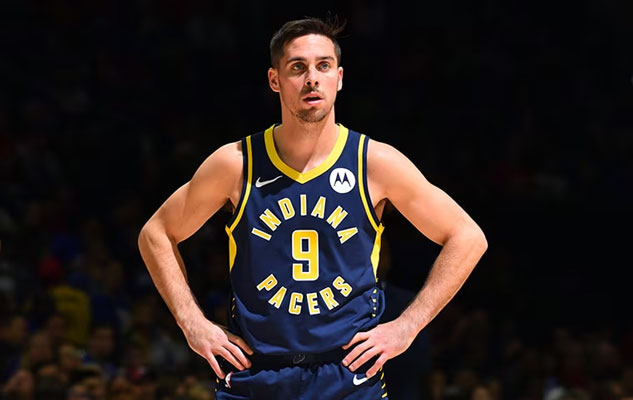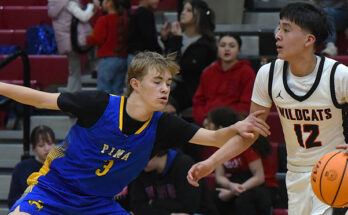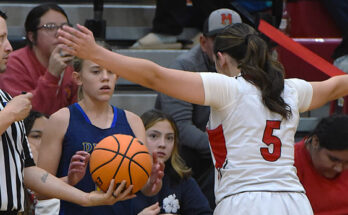By Markos Tsegaye/Cronkite News
PHOENIX – The Indiana Pacers were one win away from their first NBA championship when their franchise player, Tyrese Haliburton, went down with an Achilles injury.
The injury shook the sports world. The anticipation and intrigue in the game’s result were suddenly lost – everyone had their mind on Haliburton. But one player that shone bright, providing Indiana with belief amid the turmoil, was former Arizona guard T.J. McConnell.
Ten years removed from his time at the University of Arizona, McConnell gave the Pacers a spark whenever they needed it most. Whether he was fighting for defensive stops or rising up for mid-range jumpers, McConnell was at his best throughout the NBA Finals. He was never the biggest on the court, but no one was getting in McConnell’s way. He was going to outwork you.
“I thought we did a good job of compartmentalizing (Haliburton’s injury),” McConnell said. “I was just trying to be aggressive.”
His performance in the NBA Finals was an all too familiar sight for the Indiana faithful – a fanbase that has seen the 33-year-old point guard’s passion for the game up close since his arrival as a free agent. But on this stage, the world would be witnesses to McConnell’s dedication to winning.
McConnell’s stellar play was apparent far before his showing in the NBA Finals, however. His will to win was also on display with the Arizona Wildcats.
McConnell transferred to Arizona from Duquesne — a relatively small school located in his hometown of Pittsburgh. McConnell, not typically known for filling up the stat
sheet, spent two years at Duquesne. He showed an ability to compete there, which may seem simple but is actually a complex skill.
This is where Matt Muehlebach, a former Pac-12 broadcaster and Arizona basketball player, got his first sight of McConnell. Arizona was playing Duquesne at home in its 2011 season opener. Muehlebach came away impressed with what he saw from McConnell.
“I could really tell how good he was defensively,” Muehlebach said.
Ron Everhart, who coached McConnell at Duquesne, was familiar with McConnell’s family before recruiting him, having played with his uncle at basketball camps.
When Everhart first saw McConnell on the court, he was a freshman in high school going up against Terrelle Pryor, a top basketball prospect who later played football at Ohio State and in the NFL. Throughout the game, McConnell was taking the ball away from Pryor.
“Just T.J. doing T.J. things,” Everhart said. “He was doing the same things in high school as a freshman as he’s doing in the NBA right now.”
When McConnell first got to Duquesne, the transition was seamless, Everhart said. Everhart was a personnel-based coach, stressing the importance of prioritizing his players’ strengths. He said it would have been foolish not to do that with a player such as McConnell.
“T.J. is one of those kids that would have fit into any culture anywhere,” Everhart said. “He was far and away the best point guard in the Atlantic 10 (in his two years at Duquesne).”
McConnell’s competitiveness never subsided either, even putting it on display off the court.
When members of the Duquesne team were entering a hotel elevator, another team joined them. One coach on that team said “good to see you again” to McConnell after Duquesne had beaten them convincingly. McConnell looked at Everhart and said, “I don’t know why they’re checking in; they’re going home tomorrow anyway.”
Everhart still laughs at that moment. He said it summarized McConnell’s competitive nature. There was always a battle to win, no matter the stakes. After his time at Duquesne, McConnell transferred to Arizona.
McConnell’s first season in Tucson was spent on the sidelines as a redshirt, which was standard for transfers at the time. Steve Rivera, who covered the Wildcats during McConnell’s time with the team, said he asked Lute Olson, Arizona’s longtime coach from 1983 to 2007, how the team looked, and Olson’s response was eye-opening.
“He said, ‘It looks pretty good, but the best player isn’t eligible to play,’” Rivera said. “‘It’s the transfer from Duquesne, T.J. McConnell.’”
Rivera was not expecting Olson’s answer, but he did not think much of it because McConnell was ineligible to play that season. But it gave Rivera enough intrigue to see how good McConnell would be when he did suit up for the Wildcats.
Muehlbach described McConnell as a “low-ego guy,” and that showed in their interactions. Before covering an Arizona game, Muehlbach went to practice to get a sense of where the team was. Muehlbach pulled an assistant coach for a conversation, interested to see how McConnell was handling the redshirt year. The assistant told him how lucky the Wildcats were to have a player like that on the roster.
“He said ‘every single competition we have, he wins,’” Muehlebach said.
It never mattered who McConnell was grouped with — Olson’s assessment was accurate. It set the scene for a memorable finish to his college career.
“When you saw him, you saw him do the things you needed to see from a point guard,” Rivera said.
In his two seasons on the court, McConnell would start all 76 games for the Wildcats. He earned All-Pac-12 and All-Defensive team honors while leading Arizona to back-to-back Elite Eight appearances.
Everhart’s high expectations for McConnell at Arizona proved to be true.
“I expected him to compete for national championships, which he did,” Everhart said. “I really did think he was that good.”
Rivera said McConnell was “the straw that stirred the drink” because of his ability to maximize the players around him. He was around some high-profile players at Arizona, such as Aaron Gordon and Stanley Johnson, who were two top prospects coming out of high school.
Doug Haller of The Athletic wrote that McConnell showed leadership when he confronted Johnson for his lack of intensity at practice, which McConnell believed was getting in the way of the team’s goals. Arizona relied on McConnell’s leadership, Haller wrote, and this interaction showed why he was a valuable piece to former Arizona coach Sean Miller’s puzzle.
But even more valuable than that, Rivera said, McConnell’s traits as a person even stood out in Tucson.
“He was very bright, thought-provoking and smart,” Rivera said. “We didn’t get a lot of access to them (Arizona), but he was probably the best one of all of them during Sean Miller’s time.”
Muehlebach said McConnell was never going to ask something of his players that he was not already excelling at himself. For McConnell, working hard was a skill, and he looked to exemplify that approach every time he stepped on the court.
But McConnell’s path to the NBA was not straightforward. Shortly before his final season at Arizona ended, Rivera asked Miller about McConnell’s chances of making the NBA.
“He said, ‘He’s going to be in the NBA,’” Rivera said. “I think a lot of us (reporters) raised our eyebrows thinking, really?”
Scouts minimized McConnell’s impact based on his less-than-ideal measurables. He was an older prospect, not the tallest, lacked athleticism, and his three-point shot was a weakness.
McConnell would go undrafted in the 2015 NBA Draft because scouts failed to place a premium on his work ethic, Rivera said. But he was not deterred. He knew everyone had their own path. His was not unique, but it was going to take more work for McConnell to make a roster – nothing he would shy away from.
Everhart said the beauty of McConnell going undrafted was that every team in the league had access to him. McConnell was desired by multiple teams in the undrafted free agent market, but he chose to sign with Philadelphia. The 76ers were a young team, one that provided ample opportunity to players in need of development in an NBA setting.
“I saw what Philadelphia was doing, and I wanted to be a part of that,” McConnell told AllSportsTucson.com.
Heading into training camp, the odds were not in McConnell’s favor to make the team, as there were other point guards competing for a roster spot. But McConnell was just focused on playing hard and being himself.
He ended up making the 76ers roster. He called his friends and family afterwards to share the news, Hoops Hype reported. It was an emotional and rewarding moment for McConnell – he had officially arrived in the NBA.
But with the 76ers having the youngest roster in the NBA, the path to wins was going to be difficult. In McConnell’s rookie season, Philadelphia would have the third-worst record in NBA history, finishing 10-72.
McConnell’s tenure in Philadelphia lasted four seasons. He was a part of the shift from being the worst team in the league to one that made the playoffs in his final three seasons with the franchise. McConnell had put in the work, and again, it was time for a new chapter.
In the 2019 offseason, he signed a short-term contract with the Pacers. He has since signed two four-year contracts with Indiana worth more than $78 million.
Three of his first four seasons in Indiana were spent out of the playoffs. But the Pacers’ fortunes changed in the 2023 season as they made a surprise run to the Eastern Conference Finals as a six seed.
But this past season was about something bigger for Indiana – proving the success of the previous season was not a fluke, but a stepping stone toward something greater. While the 2024 season started off rough, the Pacers would find a way to turn things around en route to earning the No. 4 seed.
While much of Indiana’s postseason success was highlighted by late-game heroics from Haliburton, McConnell made an impact throughout the Pacers’ run to the NBA Finals.
“It sounds redundant when I say it, but I’m just trying to do my job,” McConnell said after Indiana’s Game 6 win against the Oklahoma City Thunder.
Whenever the Pacers needed a boost, McConnell was there to provide it. And similar to Haliburton, McConnell’s energy acted as a catalyst that allowed his teammates to find a groove.
But Game 7 was unique for Indiana. The shock of Haliburton’s injury could not be ignored. McConnell was one of the first to approach his teammate as he was writhing on the floor in agony. Haliburton immediately knew something serious had happened; it was a gut-wrenching moment.
But the Pacers knew what they were there for; eight months of competition led to this moment in Oklahoma City, with an NBA championship on the line.
McConnell was placed in an unexpected position, but he was ready to give Indiana hope again.
McConnell entered the third quarter with four points, and Indiana was down four points. But he kept the Pacers alive, providing bucket after bucket en route to a 12-point quarter. McConnell was operating inside the perimeter and finding a way to score – OKC had no answers.
As the Thunder’s lead would grow larger, McConnell fought to the end. He said he wanted to bring a championship to Indiana – a fanbase that has never stopped showing up for their Pacers.
“They are just absolutely incredible,” McConnell said. “Just want to apologize for coming up short. We wouldn’t be in this position without them.”
But McConnell’s impact was felt. His NBA Finals performance made a strong impression, and for some, that was enough. Everhart hosts a basketball camp for kids in Morgantown, West Virginia. He said his homework for them was to watch games 6 and 7 of the NBA Finals and to tell him what made McConnell special.
Every single kid came back with one response for Everhart: T.J. McConnell plays harder than everybody else on the court.
McConnell may not have finished the season as an NBA champion, but his will to compete proved inspiring to the youth in Morgantown. McConnell may be lacking the typical flair of an NBA star, but his willingness to compete is a trait the next generation can appreciate.











